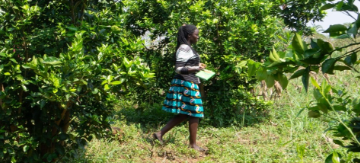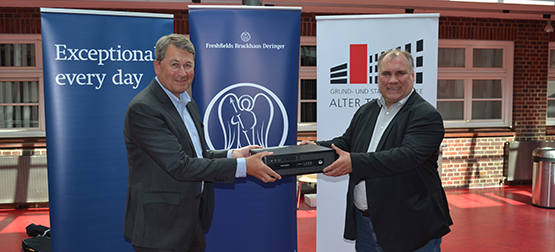Reforestation in East Africa Programme
Fighting climate change and strengthening livelihoods in East Africa
Freshfields has made a ten-year investment in reforestation in East Africa as part of its commitment to addressing climate change. Starting in 2015, the Reforestation in East Africa Programme (REAP) is strengthening the livelihoods and climate resilience of over 35,000 farmers in Kenya and Uganda - at the same time offsetting Freshfields' Scope 1 and 2 carbon emissions, and its emissions from business travel and waste.
The project empowers small groups of subsistence farmers and aims to reverse the effects of deforestation, drought and an insecure supply of food. Farmers are invited to join with neighbouring farmers to form tree planting groups (clusters) and collectively plant trees on their land.
Monthly cluster meetings enable farmers to develop and share best practice. Training is provided on conservation farming methods, nursery development, agroforestry techniques and health education to help people grow sustainable food sources, encourage diversification of income and build capacity.
The impact on people’s lives has been significant. During a visit to the Freshfields London office to share personal stories from REAP, Kenyan tea farmer Alphaxard M. Kimani recounted how replanted trees have restored biodiversity. Farmers can now provide fodder for livestock, he said. ‘The programme targets the people affected most by climate change. It makes a real difference in people’s lives.’
‘It has lifted livelihoods,’ confirmed another Kenyan farmer, Patricia Gichuri. People in her community have been educated about a range of high-yield crops, and trained in livestock rearing and beekeeping. Domesticated bees were previously unfamiliar, she said, and having a reliable source of honey has been beneficial for children’s health and provided another potential source of income.
Developing sustainable, thriving communities
Freshfields REAP is part of a larger project, The International Small Tree Planting Programme (or TIST), which helps around 90,000 farmers improve their lives and create high-value carbon credits.
In 2021, TIST became the world’s first reforestation programme to be ‘Triple Gold’ certified by the Verra Standard – Climate, Community and Biodiversity Alliance, after demonstrating exceptional benefits to the climate, biodiversity and the community. This certification was a direct result of TIST farmer’s activities extending beyond the individual and into local areas.
TIST helps diversify incomes, improve food security, provide opportunities for children and enhance gender diversity, while simultaneously improving the local environment, explains Oliver Dudok van Heel. ‘Farmers collaborate in clusters of 10-12 people with alternating four-month male/female leaderships. They gather on a regular basis, tell stories and help each other.’
This networking is another benefit of the project, says Ben Henneke of the Clean Air Action Corporation who co-founded TIST. ‘The organisational structure ended up creating ways for the farmers to talk to each other about their farms and they came up with better ideas.’
Ben says his inspiration for TIST was a trip to Tanzania in 1988: ‘We were moved by how intelligent, committed and hard-working farmers were suffering from the third drought-induced famine in the last five years. They lived in a non-cash economy, had no savings, and the government was unable to provide food assistance – it was a wrenching experience. Women and children were walking 6-12km to gather firewood and to haul back 40-litre buckets of muddy water for the family’s cooking needs – they knew the results of land degradation and unsustainable farming practices.
‘These small groups of farmers wanted to improve their situation, particularly by planting trees, to give them shade, firewood, fodder for their cattle, building materials and even fruit or nuts,’ Ben adds. ‘They were willing to work hard to change things: their attitude was inspiring, and we saw the opportunity to use a carbon trading approach to provide funds to farmers for restoring their local environment which used to have forests, be fertile, and have year-round rivers.’
‘Freshfields’ leadership is an important step toward developing sustainable, thriving communities that help heal their land, and are able to cope with the risks and impacts of climate change that we face as a global community.’
Freshfields is extremely proud of its long-term commitment to the farmers who benefit from this world-leading project. We look forward to seeing the continued success of our REAP and TIST partners, and the wider benefits to the communities they serve and the environment.


